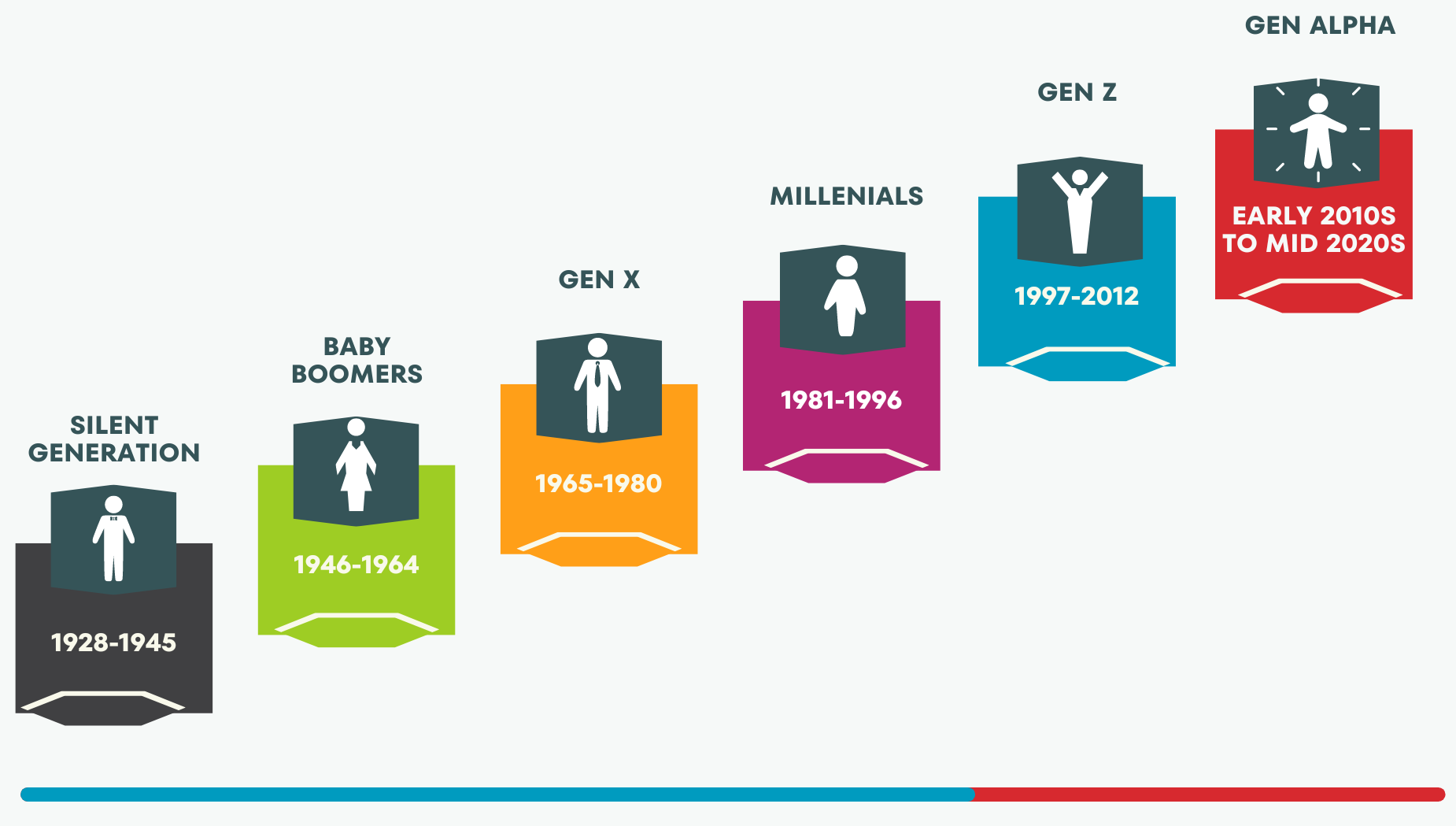The relentless nature of the recruitment cycle might explain why there seems to be little discussion about the upcoming generation entering higher education.
However, these education-savvy, hyper-connected individuals are set to become the largest generation in history within a few years..and they’ll be applying to institutions worldwide.
Who are Gen Alpha?
Named after alpha, the first letter in the Greek alphabet, Generation Alpha is the first to be born entirely in the 21st century and is defined as those born between 2010 and 2024.
An estimated 2.8 million Gen Alpha children are born every week globally, and by 2025 there could be almost 2 billion in total, based on current projections.
For Gen Alpha, adolescence begins earlier, as does social, psychological, and educational development.
Meanwhile, their adult life stage, measured by traditional indicators such as marriage, having children, and career progression is likely to be set back later.
This generation may start their careers later, live with their parents for an extended time compared to previous generations, and (good news for institutions), remain in education for longer periods.

Gen Alpha through the lens of the pandemic
The impact of COVID-19 on Gen Alpha has been significant, influencing various aspects of their lives and shaping their experiences in unique ways.
The pandemic forced the widespread closures of schools and a rapid shift to remote learning.
Gen Alpha, being heavily reliant on technology, adapted relatively quickly to virtual learning and this has influenced how this generation learns.
COVID-19 also accelerated the reliance on digital platforms for communication, education, and entertainment. Gen Alpha, already tech-savvy, became even more digitally dependent.
And lockdowns and social distancing measures brought about changes in family dynamics.
Gen Alpha spent more time at home with their parents and siblings. This may have strengthened family bonds but could also have impacted their socialization skills.
But in addition to these unprecedented changes, Gen Alpha came out the other end of the pandemic and may be better equipped to navigate an ever-changing future with a level-headedness and problem-solving mindset that sets them apart from previous generations.

Gen Alpha will soon be ready in 2026!
Emerging characteristics of Gen Alpha
Digital natives
Do you remember back in 2010? That's when Gen Alpha started to be born.
It was also the year when the iPad was launched, Instagram was released, and 'App' was announced as the word of the year!
Gen Alpha is the first true generation of digital natives.
From the day they were born, they've been surrounded by phones, tablets, and other digital devices such as smart speakers.
For this generation technology, is interwoven in their day-to-day lives and information is right at their fingertips—but they also have an awareness of digital fatigue and the downsides of excessive digital exposure.
Beyond the screen
This upcoming generation may like the things they lost through the pandemic, like spending time with others and going to school.
Family time could become more important to them, and working and learning from home as well as out of the home will be more natural for them.
Environmentally aware
Raised in an era of heightened environmental awareness, Gen Alpha is maturing in a time of climate emergency and therefore tends to be socially conscious and environmentally responsible.
However, compared to the previous generation, the narrative seems to be shifting from just taking personal responsibility to an expectation that organizations will do their bit in terms of sustainability action.
Global citizens
Compared to previous generations, Gen Alpha has a truly global outlook. The internet, social media, and easier access to information have helped to dismantle geographical boundaries exposed this generation to diverse cultures, languages, and viewpoints, and fostered a sense of interconnectedness and global citizenship.
They might also look up to different kinds of heroes, like medical researchers and nurses, and question the glossy Instagram image cultivated by previous generations, seeking out authenticity more effectively.
Where and how to connect with Gen Alpha to maximize engagement
Cross-platform communications
This generation is platform agnostic, with conversations traversing naturally across Snapchat, WhatsApp, and Instagram, but the go-to platform for entertainment and bite-size information remains TikTok, and its popularity continues on a trajectory.
Institutions building successful social media strategies are likely to have coverage across platforms but in particular will need to grow their TikTok presence (if it doesn’t end up banned from the US).
Mixed reality
As Gen Alpha matures and approaches university age, the depth and capabilities of online worlds are also evolving.
Mark Zuckerberg, notably, has described the metaverse as the 'next evolution of social connection.'
In-game socializing has become the norm, and it appears that online spaces for socializing will likely be commonplace just as Gen Alpha reaches university age, providing early opportunities for natural engagement in an entirely new format.
Video content
Gen Alpha has come of age in an era of lightning-fast Wi-Fi and robust 4G capabilities.
As internet speeds accelerated, so did the prevalence of video consumption, with this latest generation dedicating more time to platforms like YouTube, TikTok, and Snapchat than any of their predecessors.

Crafting authentic, engaging, and informative higher education content is therefore essential to capture and maintain their attention, not just for social media platforms but also for the main website and other digital initiatives.
Education gamification
Given that Gen Alpha grew up learning with digital devices, products that combine play with learning opportunities are particularly appealing.
Gen Alpha expects an engaging and modern approach to learning, and institutions who invest in this and articulate it clearly will capture this generation’s attention.
Beyond traditional screens
Voice search is already commonplace but new devices are emerging including mixed reality headsets like the Apple Vision Pro and Ray-Ban Meta Smart Glasses, and AI ‘helpers’ like the Rabbit R1.

Aside from voice search which places even greater importance on the fundamentals of SEO and structured content, these are difficult to plan for but still worth keeping an eye on as their form factor improves and they move into the mainstream.
Adopting the right tone in your marketing
Gen Alpha will seek out transparency, authenticity, and advocates in communications.
They’re also receptive to values conveyed by organizations and want to feel a genuine connection with those they engage with.
Are you committed to social causes? Are you environmentally conscious?
These questions will matter even more to the students of tomorrow compared to today’s generation.
Promote diversity and social awareness
Gen Alpha are potentially the most ethnically aware and socially conscious generation so far, and hold strong opinions about the world we live in today and how they fit in.
Universities and colleges will need to embrace and communicate their commitment to diversity and inclusivity.
Offer personalized experiences
This generation is used to creating online personas, co-creating content, and personalizing online and offline products.
They’ll expect more than a first name greeting, and respect carefully thought out hyper-personalized experiences.
Key takeaway
By 2026, Gen Alpha will start to become the main focus of higher ed marketing efforts.
The good news is that there is plenty of research about the next generation and some of their characteristics and values build off what we’re already experiencing with current students.
Our content, marketing strategies, and tactics will need to change, but the important thing is that these generalizations and ideas are just a starting point.
Institutions will be continually talking to current and future students to understand what matters to them and by doing so you can validate the strategies you’re putting in place.
Planning for the students of tomorrow is certainly not easy—it takes time, investment, and strategic direction.
The challenge for institutions will be in preparing for the first round of Gen Alpha students
Is there any talk about Gen Alpha at your institution or is it a topic for further down the line? Reach out to the team and let them know your thoughts.

:format()//media/Get-to-know-Gen-Alpha-for-higher-education---RQ.png)